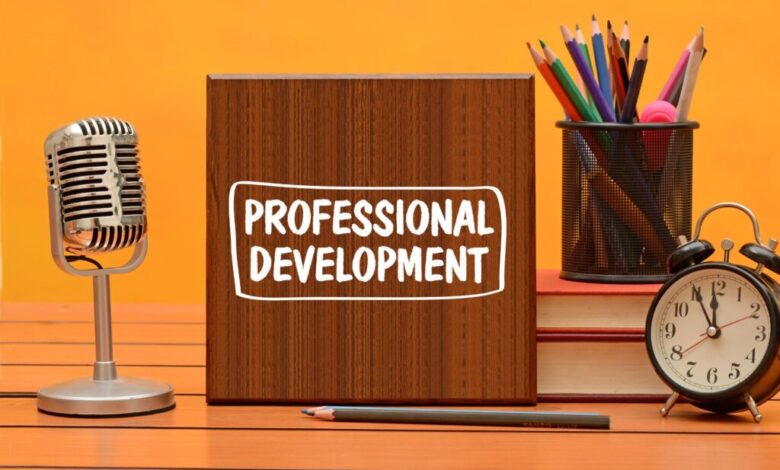Professional Development: Unlocking Your Career Growth Potential

Professional development is an essential part of career advancement. Whether you’re just starting out in your profession or are already an established expert, continuous learning, skill enhancement, and personal growth are key to staying relevant and excelling in your field. In today’s ever-evolving job market, those who invest in their professional development are better positioned to take on leadership roles, increase their earning potential, and achieve long-term career satisfaction. This article delves into the importance of professional development, its various types, and the key strategies to implement for personal and career growth.
What is Professional Development?
Professional development refers to the process of improving and increasing one’s capabilities, knowledge, and skills to advance in their career. It involves engaging in activities and opportunities that enhance your professional skills and expertise, whether through formal education, workshops, mentorship, or on-the-job experiences.
Professional development is a lifelong process that can take many forms, from attending industry conferences to taking online courses, or even seeking feedback and mentorship from colleagues. It is not limited to formal education but extends to any activity that helps individuals become more proficient, knowledgeable, and effective in their roles.
Why is Professional Development Important?
1. Improves Job Performance
Investing time and effort into professional development allows individuals to stay updated with the latest trends, tools, and practices in their industry. As a result, employees are more likely to perform their jobs effectively and efficiently. Professional development ensures that individuals possess the skills necessary to meet job demands and challenges, which ultimately improves productivity and job satisfaction.
2. Enhances Career Growth
Professional development is crucial for career progression. By acquiring new skills, earning certifications, or expanding knowledge in different areas, individuals increase their chances of advancing to higher positions within an organization. This type of development demonstrates commitment to personal growth and signals to employers that an individual is proactive and motivated to succeed.
3. Boosts Confidence
As employees enhance their skill sets and gain new knowledge, they are likely to feel more confident in their abilities. This confidence translates into greater success, whether it’s handling new responsibilities, leading projects, or engaging with clients. Confidence is a key component of professional development, as it empowers individuals to take on new challenges with a positive attitude.
4. Keeps You Competitive
The modern job market is highly competitive, and industries are constantly evolving. Keeping up with the latest technologies, methodologies, and trends is crucial to remaining relevant. Professional development helps you stay ahead of the curve by continuously refining your skills and adapting to the changing landscape of your profession.
5. Opens Up New Career Opportunities
Developing new skills can open doors to new career opportunities. Whether it’s moving into a higher-level position or changing industries altogether, professional development provides the flexibility to pursue a variety of career paths. Furthermore, having a diverse skill set makes you a more attractive candidate to potential employers, increasing your chances of finding new and exciting career opportunities.

Types of Professional Development
1. Formal Education and Certifications
One of the most well-known forms of professional development is formal education. This could mean completing a degree, attending workshops, or earning industry-specific certifications. Formal education often provides individuals with in-depth knowledge and specialized expertise in their field. For example, pursuing a Master’s degree or obtaining certification in a specific area of expertise can be an excellent way to boost your qualifications.
2. On-the-Job Training
Many professional development opportunities arise from hands-on experience in the workplace. On-the-job training allows individuals to learn new skills while performing their daily tasks. This may involve taking on more challenging responsibilities, shadowing senior employees, or learning new software systems. On-the-job learning helps employees gain practical, real-world experience that is often more valuable than theoretical knowledge.
3. Mentorship and Coaching
Mentorship and coaching are valuable ways to accelerate professional development. A mentor or coach provides guidance, feedback, and advice based on their own experience in the field. Whether informal or formal, having a mentor can help you navigate your career, avoid common mistakes, and grow professionally. Mentors can also provide valuable networking opportunities, which can open doors to new roles and projects.
4. Workshops, Seminars, and Conferences
Attending industry-related workshops, seminars, and conferences is an excellent way to expand your knowledge and network with like-minded professionals. These events often feature keynote speakers, training sessions, and interactive activities that can enhance both technical and soft skills. Participating in these events can also expose you to new ideas and trends within your industry, keeping you informed and up-to-date.
5. Online Courses and Webinars
In recent years, online learning platforms have gained significant popularity due to their convenience and accessibility. Many websites, such as Coursera, LinkedIn Learning, and Udemy, offer online courses in a wide variety of subjects. These courses can be a more flexible option for individuals who want to learn new skills without the commitment of formal education. Webinars are also a great way to learn from experts in your field without leaving your home or office.
6. Self-Directed Learning
Self-directed learning refers to taking initiative and responsibility for your own education. This could involve reading books, articles, or research papers, or even watching educational videos related to your field. Self-directed learning is an effective way to stay informed and continuously improve your skills without waiting for a formal program to be offered.
Key Strategies for Professional Development
1. Set Clear Career Goals
To make the most of your professional development efforts, it’s essential to set clear, measurable career goals. Establishing goals helps you stay focused on your objectives and gives you a roadmap to follow. Whether your goal is to earn a promotion, gain a new skill, or transition into a different role, having a clear vision of your career path will guide your development efforts.
2. Seek Feedback and Self-Reflection
Constantly seeking feedback from peers, mentors, and supervisors is an important part of professional growth. Constructive feedback helps you understand areas where you can improve and guides your development efforts. Additionally, self-reflection is crucial in evaluating your strengths and weaknesses. Taking the time to assess your own performance allows you to identify areas of improvement and celebrate your successes.
3. Develop Soft Skills
While technical skills are essential in many professions, soft skills are often just as important. Soft skills include communication, leadership, time management, emotional intelligence, and problem-solving abilities. These skills are transferable across industries and can greatly enhance your effectiveness in the workplace. Focusing on developing both technical and soft skills will make you a more well-rounded professional and increase your career prospects.
4. Network and Build Relationships
Networking plays a significant role in professional development. Connecting with colleagues, industry professionals, and potential mentors helps you stay informed about trends in your field, share ideas, and find new career opportunities. Attend networking events, participate in industry forums, and engage with professionals on platforms like LinkedIn to expand your network.
5. Stay Current with Industry Trends
Staying up to date with the latest trends and innovations in your field is crucial for career growth. Read industry journals, attend conferences, and engage in professional communities to keep yourself informed. By understanding emerging trends, you can position yourself as a forward-thinking professional ready to take on new challenges and opportunities.
Also Read: Business Strategies: Unlocking the Key to Long-Term Success

Balance Work and Life
Maintaining a healthy work-life balance is essential for long-term professional development. Overworking can lead to burnout, while neglecting personal well-being can hinder your professional growth. Ensure that you make time for relaxation, exercise, and activities that promote mental and physical health. A balanced approach will allow you to remain focused, energized, and productive in your career.
Conclusion: Take Control of Your Professional Development
Professional development is a lifelong journey that plays a significant role in career success. By continuously enhancing your skills, gaining knowledge, and building relationships, you can unlock new opportunities and achieve long-term career satisfaction. Whether you pursue formal education, mentorship, self-directed learning, or hands-on experience, investing in your growth will provide lasting benefits.
The key to effective professional development is staying proactive. Set clear goals, stay informed about industry trends, seek feedback, and commit to continuous learning. With the right strategies, you can enhance your career potential and unlock a future full of opportunities.





